The views expressed in our content reflect individual perspectives and do not represent the authoritative views of the Baha'i Faith.
Can any religion of the past now serve the needs of a rapidly-globalizing humanity with its diverse spectrum of spiritual beliefs? If so, what religion and which branch of it should we choose?
Here are two even more pointed questions: Why would we think that any ancient religious prescriptions would still fit our current reality? And how could we justify imposing a religion from one culture or region of the world onto other cultures now served by other religions?
The Baha’i teachings approach these critical questions by reminding us that the Promised Day is not about a return to past religions – instead, it promises a new Faith accessible to all.
This principle recognizes that the world’s major religions share fundamental moral values, all essential to our collective security. Without them, character becomes perverted, strong or clever people find ways to take advantage of others, society becomes polarized, and violence, oppression, depression, chaos, inhumanity, and insecurity spread.
RELATED: Where Do Love and Justice Unite?
In this new day we continue to need the core values taught by every great Faith: honesty, trustworthiness, purity of motive, helpfulness, self-sacrifice, nobility, wisdom, forbearance, patience, caring, compassion, courage, forgiveness, self-discipline, unity, and many others. But in this age two specific moral virtues are of special concern: love and justice. The success of everything rests upon them.
Love
In 1 Corinthians 13, Saint Paul proclaimed that love is the prince of virtues, stronger even than faith and hope:
Love is patient, love is kind. It does not envy, it does not boast, it is not proud. It does not dishonor others, it is not self-seeking, it is not easily angered, it keeps no record of wrongs. Love does not delight in evil but rejoices with the truth. It always protects, always trusts, always hopes, always perseveres.
So conceived, love is about not reacting quickly to perceived insults or wrongs, it’s about overlooking them, while forgiving, elevating, and protecting others. We will not long survive in this new day, when the world has contracted into a neighborhood, unless we learn to apply this ancient lesson.
While love can be passive and tolerant, it also requires action. One of the strongest themes in the Qur’an is that God loves those who do good, those who are kind, and those who work deeds of righteousness. Both the Qur’an and hadith record Muhammad as saying: “None of you truly believes (in God and His religion) until he loves for his brother what he loves for himself.”
Judaism, Hinduism and Buddhism, of course, concur about the importance of love, and the Baha’i Faith furthers that essential religious rule, as in this quotation from the writings of Abdu’l-Baha:
Love is the light that guideth in darkness, the living link that uniteth God with man, that assureth the progress of every illumined soul. Love is the most great law that ruleth this mighty and heavenly cycle, the unique power that bindeth together the divers elements of this material world, the supreme magnetic force that directeth the movements of the spheres in the celestial realms. Love revealeth with unfailing and limitless power the mysteries latent in the universe. Love is the spirit of life unto the adorned body of mankind, the establisher of true civilization in this mortal world, and the shedder of imperishable glory upon every high-aiming race and nation.
While love is the cause of our being, and the light within us that draws us together, we now live in a world where much love has been lost or never established, and we need a foundation to move us towards love. We have been injured and we are distrusting. We have been abused and much of the world and its actors are unknown and unfamiliar to us. How can we trust and love them?
RELATED: What World Religions Say About the Nature of Love
Justice
What we crave when we have been wronged, and what we need when we want to build a better social order, is justice. It is, the Baha’i writings proclaim, “the best beloved of all things” in the sight of God. Little human progress can be accomplished without it. All people, made in the image of God, want to be treated with respect and fairness. Much of the agitation of the world occurs because people of many nations and races feel disrespected by the powerful of the world, recognizing that they have been treated unjustly. Thus, institutions that deliver true justice – not payback or retribution, but fairness – must be part of the foundation for humanity’s future well-being. Every past religious revelation has promised us justice, and the Baha’i teachings say that its time has finally come: “We exhort all believers,” Baha’u’llah wrote, “to observe justice and fairness and to show forth love and contentment.”


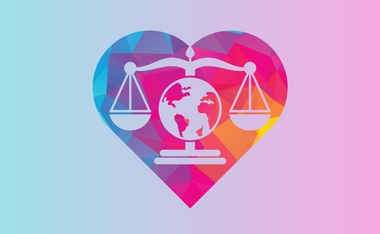



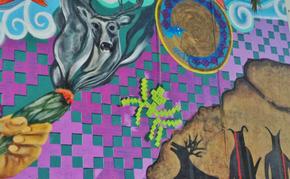
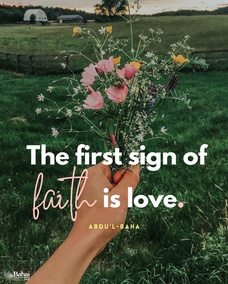
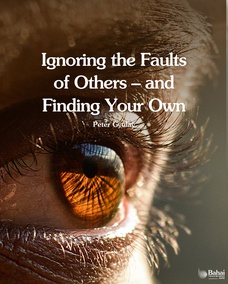
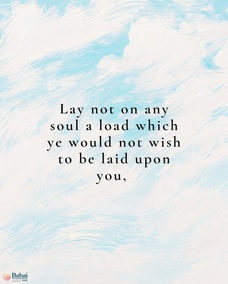

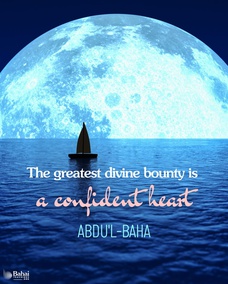
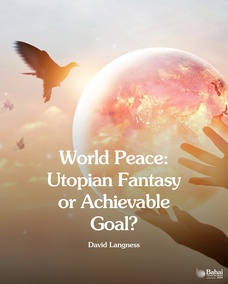
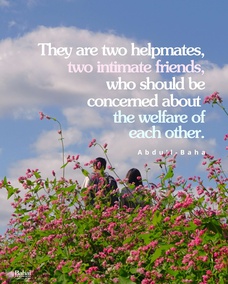
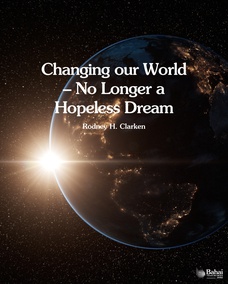

Comments
Sign in or create an account
Continue with Googleor